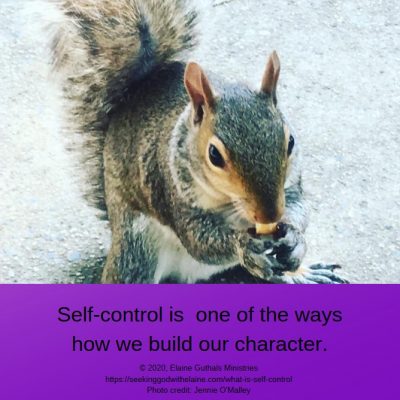Don’t most of us need more self-discipline when we are facing temptation? But how is self-discipline different from self-control? This devotion looks at those two terms and determines what we can gain by disciplining ourselves.
Nuggets
- Self-control is where we master our reactions and one of the ways how we build our character.
- We’ve got to squash the sin, not turn a blind eye.
- Self-discipline helps us correct things we don’t – and God doesn’t – like within ourselves.

We have been talking about sin and temptation to set the foundation for self-discipline. Now, we get to start talking about self-discipline.
Let's Put It into Context
“Temptation comes from our own desires, which entice us and drag us away” (Jas. 1: 14 NLT)
Sin is when we disobey God and break one of His laws and commandments. It is breaking a rule that God has established.
The period of time between the thought to sin and the actual commission of the sin is called temptation. It is a testing to see whether we will commit the sin or stay true to God.
God tests us but does not tempt us. Satan tempts us but, really, can do nothing about it.
The choice to sin is ours. It comes from inside of us. Opportunities to sin may be presented from outside, but the desires are inside of us.
So, how do we control those desires? How do we discipline ourselves to withstand the temptation?
What Is Self-Control?
“A man without self-control is like a city broken into and left without walls” (Prov. 25: 28 ESV)
Self-control is the ability to regulate emotions, thoughts, or behavior in the face of temptations. It is where we master our reactions. Murray made a real good point: “Laws control the actions; but actions are only the results of emotional causes.” Laws cannot control what is inside us.
We have to remember that God does not force His laws and commandments on us. He has given us our own free will.
Self-control is a fruit of the Spirit. “But the fruit of the Spirit is love, joy, peace, patience, kindness, goodness, faithfulness, gentleness, and self-control …” (Gal. 5: 22-23 CSB).
The old-time word is temperance. That means, according to Merriam-Webster, “moderation in action, thought, or feeling — restraint.” It talks about a habitual moderation.
Ooo, baby. I like that for one aspect.
Moderation is where we avoid excesses. We avoid something that is more than necessary.
We need to avoid temptations — in that we should not commit the sins. We cannot avoid them — as in ignore them.
We’ve got to squash the sin, not turn a blind eye.
For some sins, though, there is no excess. There is just avoid.
Self-control is important. It is one of the ways how we build our character. Those are the qualities that make us, us. If we don’t control what makes us, us, how can we be the people we want to be?

What Is Self-Discipline?
“Instead, I discipline my body and bring it under strict control, so that after preaching to others, I myself will not be disqualified” (I Cor. 9: 27 CSB)
To me, self-discipline brings the self-control. Self-discipline is defined as “correction or regulation of oneself for the sake of improvement.” Self-discipline helps us correct things we don’t – and God doesn’t – like within ourselves.
A big portion of the self-discipline is mind over matter. The mind has to control the body. The body has to be the servant of the mind.
I know we all know that. I know I am preaching to the choir. We just have to find a way of doing that.
Aitken said that “Paul imagines to himself his body as rising up against his higher nature; and against this foe he directs his well-aimed blows; not to destroy or even mutilate it, but to render it what it always ought to be — the obedient slave of the inner nature.” That is a visual!
Yes, our bodies are to be temple (I Cor. 6: 19-20), and therefore, we have to take care of them. But sometimes that means pruning (Jn. 15: 2).
You know what pruning is, right? Part of that is cutting away the dead stuff on a plant. The other part is cutting away the live, overgrown stuff.
In other words, when I had my rose garden, I didn’t just put them in the ground and say, “Go forth and grow.” While the roses were in bloom, I would pull off all of the dead blooms. Then in the fall, I would take my trusty shears and cut them back. That way the bushes would grow in the way I wanted them to grow.
Oh, yes. God wants us to be deadheaded and pruned. He wants to show us the way He wants us to grow.
But ouch. I am allergic to pain. And here it implies that we have to choose to make pain — on ourselves?????
Are we ruthless enough to do what it takes to make sure we follow God’s laws and commandments? Or do we wimp out when we count the cost?
Paul would have known about the advice he was giving. First Corinthians was probably the fourth letter written. It may have been twenty years after his conversion.
Paul knew what he was talking about.
But think of it this way. This is Paul we are talking about — the Energizer Bunny for God. He was someone really deserving to be a Hall of Famer.
Paul still thought about the war with his flesh. He was saying we never “arrive” here on earth. We have to keep the self-discipline functioning.
No matter how much we grow in grace and knowledge (I Pet. 3: 18), there will always be the battle while we are in these earthly bodies.

What Do We Gain by Self-Discipline?
We generally want to know what is in it for us. So, what do we gain by self-discipline? Thornton gave us a good list.
There is a freedom we enjoy when we are self-disciplined. We are more able to withstand Satan in his attempts to get us to sin. That gives us peace and joy.
While it might be pleasurable at first, sin definitely does not end up that way. The separation from God is heart-wrenching. Self-discipline helps us not go down that road.
When we are self-disciplined, God blesses us with His glory. Glory is the expression of the qualities of God resulting from the authority of God.
To read a related devotion, click the appropriate button below.
The qualities of God are His holiness and righteousness. Those are what we are to imitate (Eph. 5: 1).
To read a related devotion, click the button below.
Life will be better when we discipline ourselves to follow God’s laws and commandments. We can then tap into His love, peace, and joy.
To read a related devotion, click the button below.
Self-discipline helps ups to get the focus off of us and onto others. It takes the focus off of “I want” to see the need in others.
Self-discipline allows us to focus on what God is calling us to do. We are putting Him first, so we can focus on His purposes.

Making the Connections
When we set a goal, we like to achieve goal completion. This goal will have delayed completion. We aren’t going to be totally self-disciplined until we get to heaven.
But we do have responsibilities. We do have our job description.
I found an interesting sermon. It is Hickman’s The Duties of Religion.
In it, Hickman states, “The great business of religion is to teach us not to sin. To subdue our unruly lusts, and reduce our troublesome affections, and to bring every rebellious thought into subjection to the will of God; to restore virtue to its proper place, and reason to its due command; and to recover the natural freedom of our will from the tyranny of our passions, and the usurpation of vice.”
I can agree and disagree with that. I guess it is dependent on the definition of religion that we use.
One of the definitions of religion is “a personal set or institutionalized system of religious attitudes, beliefs, and practices.” To me that is just the laws and the commandments.
The other is “the service and worship of God or the supernatural” or “commitment or devotion to religious faith or observance.” That gets closer. I like the service, worship, commitment, and devotion aspects. That is what teaches us the self-discipline to follow the laws and commandments. It also goes toward the relationship with God.
But to me, those statements are just boiling it down to being good or bad. It makes it sound like we earn salvation by being self-disciplined. We don’t.
Being a good person does not make us closer to God — unless we have made the decision to accept Jesus as our Savior and God as our Sovereign God. It isn’t about obedience. It is about a relationship.
Just following the rules isn’t it. It isn’t about us and what we can do. It is about God and what He has done through Jesus’ sacrifice.
How Do We Apply This?
We have to watch when we get the pruning shears out. Our natural inclination is going to be to cut a bouquet for the dining room table.
Don’t do it! Get the pruning done.
Paul’s best advice was to walk in the Spirit (Gal. 5: 16-25). We can’t do it on our own. Self-discipline has to be God-discipline.
Where is our line of acknowledging the pretty rose is there and cutting the rose so we can take it in the house so it will just be ours for our enjoyment?
Oh, I know. We have barely scratched the surface of self-discipline. We’ll go on in the next devotion on some of the battles we encounter.
Father. You are holy and righteous. We want to be like You. Forgive our sins. Help us to withstand the temptation by self-discipline. We know, however, that the discipline must come from You. Help us to grow and imitate You, so that when the temptations come, we can say, “We will never deny our God” — and live up to that. Amen.
What do you think?
Leave me a comment below (about this or anything else) or head over to my Facebook group for some interactive discussion.
If you don’t understand something and would like further clarification, please contact me.
If you have not signed up for the email daily or weekly providing the link to the devotions and the newsletter, do so below.
If God has used this devotion to speak with you, consider sharing it on social media.
Pingback: Temperance as a Virtue – Seeking God with Elaine
Pingback: Why Should We Study Scriptures? – Seeking God with Elaine
Pingback: Love and Obedience: The Last Two Steps in Salvation – Seeking God with Elaine